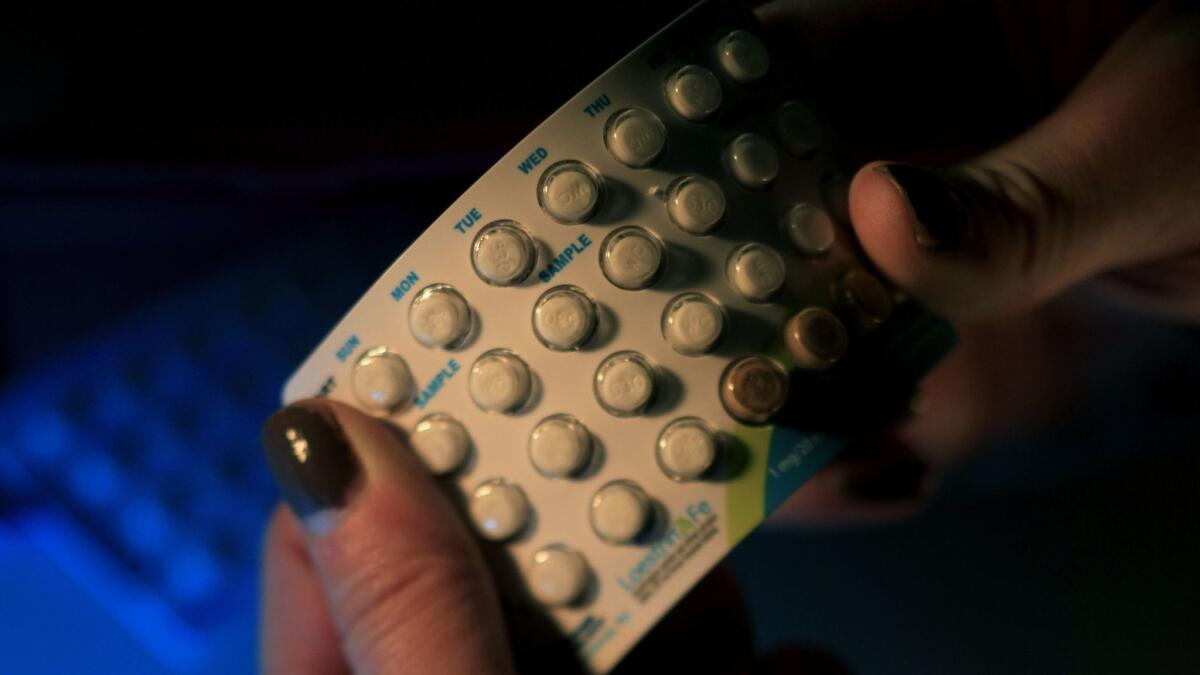Trump lets more employers choose not to cover workers’ birth control

- Share via
President Trump is allowing more employers to opt out of providing no-cost birth control to women by claiming religious or moral objections, issuing new rules Friday that take another step in rolling back President Obama’s signature healthcare law.
The new policy is a long-expected revision to federal rules that require most companies that offer health insurance benefits to cover birth control as preventive care for women at no additional cost. Preventive services are supposed to be free of charge to employees and their dependents under Obama’s Affordable Care Act.
Most women with health insurance no longer pay for birth control, and advocates immediately announced plans to try to block the new rule in court.
Trump’s religious and moral exemption is expected to galvanize both his opponents and religious conservatives who back him, but it’s likely to have a limited effect on the nation’s largely secular workplaces.
Although tens of thousands of women could be affected by Trump’s new policy, the vast majority of companies have no qualms about offering birth control benefits through their health plans. Human resource managers recognize that employers get an economic benefit from helping women space out their pregnancies, since female workers are central to most enterprises.
The administration estimated that some 200 employers who have already voiced objections to the Obama-era policy would qualify for the expanded opt-out, and that 120,000 women would be affected. However, it’s unclear how major religious-affiliated employers such as Catholic hospitals and universities will respond.
Since contraception became a covered preventive benefit, the share of women employees paying their own money for birth control pills has plunged to less than 4%, from 21 %, according to the Kaiser Family Foundation.
The Trump administration’s revision broadens a religious exemption that previously applied to houses of worship, religiously affiliated nonprofit groups and closely held private companies. Administration officials said the new policy defends religious freedom. Privately owned for-profit companies, as well as publicly traded for-profit companies, will be able to seek an exemption.
Officials also said the administration is tightening oversight of how plans sold under the healthcare law cover abortion. With limited exceptions, abortions can be paid for only through a separate premium collected from enrollees. No public subsidies can be used except in cases that involve rape, incest or preserving the life of the mother.
Doctors groups that were key to derailing Republican plans to repeal the healthcare law outright expressed dismay over the administration’s move on birth control.
The American Congress of Obstetricians and Gynecologists said the new policy could reverse the recent progress in lowering the nation’s rate of unintended pregnancies.
“Instead of fulfilling its mission ‘to enhance and protect the health and well-being of all Americans,’ HHS leaders under the current administration are focused on turning back the clock on women’s health,” said the organization’s president, Dr. Haywood Brown.
Women’s groups said they would try to stop the administration from carrying out the changes.
“The rules give employers a license to discriminate against women,” said Fatima Goss Graves, president of the National Women’s Law Center. “We will take immediate legal steps to block these unfair and discriminatory rules.”
Administration officials said the new policy takes effect right away.
UPDATES:
8:40 a.m.: This article was updated throughout with additional details.
This article was originally published at 8:30 a.m.
More to Read
Inside the business of entertainment
The Wide Shot brings you news, analysis and insights on everything from streaming wars to production — and what it all means for the future.
You may occasionally receive promotional content from the Los Angeles Times.










